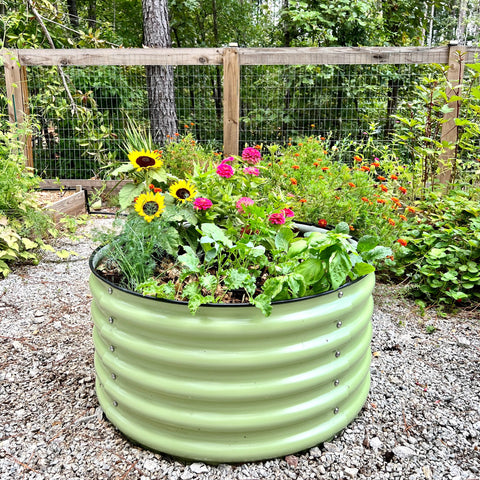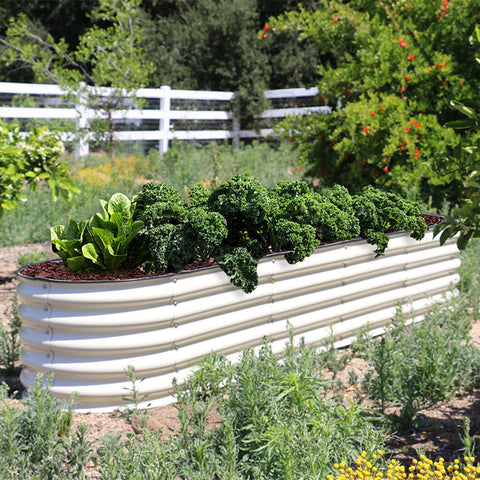Tips from Olle Garden Bed: Practical And Effective Gardening Techniques For Strange Vegetables
As an avid vegetable grower, I have been looking for ways to improve my (not so small) garden. These vegetable gardening tips will help you grow more food with less effort. I deliberately omitted the common skills that every gardener worth salt knows, so I hope you can find many things you have never seen before! The following content also has some reference value for raised garden beds.

- Replenish dry soil moisture with detergent
If you find that water just flows out of the potted soil, try this tip. When the soil becomes too dry, it begins to repel water rather than absorb it. This is especially true for soils with high organic matter content and low clay content.
A simple tip is to use eco-friendly dishwashing liquid when watering next time. Detergent will decompose the wax and oil in the soil (leaves and wood have high oil content), and water will be directly immersed in it.
You can mix soap into a watering can, squeeze it on the soil or use a hose end spray to get the best coverage. A little detergent will help!
- Turn the yellow lawn green again
Fertilizers are expensive and not always effective. If you need to green the lawn in a hurry, please try this secret tonic. Sugar in soda water helps to stick nutrients on the lawn, yeast in beer reactivates soil microorganisms, and detergent acts as a wetting agent.
Mouthwash is very effective in killing lawn beetles and pests. Ammonia can quickly absorb nitrogen that is easy to absorb, allowing your lawn to grow.
A whole can of regular soda (any kind - sugar free soda)
A whole can of beer (excluding light beer) 12oz
1/2 cup liquid dishwashing soap (do not use antibacterial dishwashing liquid)
1/2 cup household ammonia
1/2 cup mouthwash (any brand)
Use a hose end spray like this to spray the tonic onto the lawn for the best coverage. Using a hose end spray is one of the best vegetable gardening skills for beginner gardeners.
- Protect seedlings with eggshells
This is a common vegetable gardening skill, but I still see many gardeners throw eggshells into trash cans or compost bins! Eggshells are the most effective way to prevent snails and slugs from eating seedlings and young plants.
Either press them in your hands and scatter them around the crops, or flash them into the coarse sand in the blender to make easy to use dust. Ideally, you want the eggshells to be sandy consistency. If they are too thin, the eggshells will decompose too quickly to be useful.
Don't have enough eggshells at home? You can buy them in bulk here and have them crushed. Another good option is to use crushed shells, which are often cheaper.
- Use cinnamon to get rid of mold
A good tip for raising seedlings without chemicals or getting rid of mold and mildew. Just sprinkle cinnamon on infected plants, and the antibacterial properties will quickly solve plant diseases.
Place half a cup of cinnamon in a glass jar and secure some cheesecloth to the top with elastic tape. Shake the jar over the crops, leaving a thin layer of cinnamon on the leaves.
Professional tips: You can obtain cinnamon in batches at a cheap price here
- Milk bottle watering can
Upgrade the plastic milk bottle to a watering can by rinsing and punching the lid. Be careful not to put them outside in the sun, as the plastic will quickly decompose and become brittle.
This is better for liquid fertilizers. Just add specific nutrients to a single milk bottle water dispenser, and you can quickly pick me up when the plants show signs of lack. I usually have one bottle of insect juice (diluted), another bottle of potassium fertilizer (such as liquid bat and bird droppings) to promote my tomato crops, and the other bottle of chelated iron and magnesium to repair yellowing leaves.
- Use coffee grounds to reduce pH
If you want to plant blueberries or other acid plants, please mix some coffee grounds into the soil. The ground is acidic, which will greatly promote the growth of your plants, and they also contain a lot of nitrogen.
- Apply dolomite lime every year
I was surprised how many gardeners did not. Even if you plant your garden in highly alkaline soil, you should apply white cloud lime to your crops at least once a year. Dolomite lime contains 50% magnesium carbonate and 50% calcium carbonate, two essential nutrients for growing healthy vegetable crops.
Calcium helps plants build strong cell walls and prevent pests and diseases. Magnesium is one of the key components of photosynthesis, which is a way for plants to generate energy and grow.
100 grams per square meter in sandy soil and up to 300 grams per square meter in soil with high organic matter.
**Make sure you use dolomite lime instead of agricultural lime (without magnesium carbonate)

- Use this strange vegetable gardening technique to keep the soil moist
We wear so many diapers at home. It's crazy! So I've been thinking of interesting ways to reuse them. This is by far my favorite method. Put 2-3 diapers into the bottom of the pot and fill it with soil. When you water the plant, the diaper will absorb water and release it slowly according to the needs of the plant.
Professional tip: I made a mistake. I put diapers in the wrong place. They didn't absorb too much water, so we must put them in with the absorption side facing up!
If you don't have children, you can always buy some cheap diapers here.
- Broken Terra Cotta Warriors
oh dear! When you break one of your Terra Cotta Warriors pots, don't you hate it? Well, instead of just throwing away the pieces, reuse them as garden labels. All you need is a sharp knife (this chisel tip is most suitable for writing on terra cotta) or a permanent marker pen, and everything is ready.
Write down your label and push the tip of the broken pot into the ground. Debris too small for the label can be ground into dust and re added to the soil to increase aeration and drainage.
- Photo album seed organizer
There are dozens of vegetable seeds around every vegetable gardener. It is easy to misplace seed bags or knock them down and lose all seeds on the floor. One of the best ways to keep your seed packs organized is in the album (yes, they still exist - you can buy them here).
Professional tips: Get an album every season, so you can take out the correct seed catalog and start sowing! Ensure that all seed packages are clearly dated so that old seeds can be planted before they become obsolete.
- Save your cooking water
Cooking your vegetables can be very beneficial. If you boil or steam your vegetables, then keep cooking water. Wait for it to cool down, and then water the plants. The water contains a lot of nutrients, which can quickly cheer up your plants. The mixed smell of vegetables will confuse pests!
You are not limited to vegetable water. You can use any cooking water or food liquid, including meat and dairy products. Just make sure you dilute anything that is too concentrated.
- Super sweet tomatoes
If your tomatoes taste a little bitter, you will like this vegetable gardening technique. Just sprinkle 1-2 tablespoons of baking soda on the bottom of the tomato bush, and you will have the sweetest tomato you have ever eaten!
Be sure to leave them on the vine until they are fully mature, so as to obtain the best taste and the strongest flavor.
You can buy cheap bicarbonate soda here in bulk.
- Seed tape distributor
We've all heard of using toilet paper to make our own seed tape, but storing seed tape can be annoying. Unless you use this little trick to wrap it back on the toilet roll!
Make sure to use toilet paper that is safe for septic tanks or sewers because it decomposes much faster than ordinary toilet paper and is free of any nasty chemicals.
- Muffin tin gasket tool
Your chef may not like this strange vegetable gardening technique, but just remind them of all the fresh produce you are going to grow. The muffin tray provides perfect spacing for your lettuce, carrot and onion seedlings.
Rake the garden bed fresh, then use the muffin tray to press the hole into the soil. Once you put the seeds in, put the back of the rake on the hole and cover them with soil.
You can sometimes find old muffin trays in second-hand stores. Otherwise, these cheap muffin trays are perfect for gardens.

- Prevent dirt from entering under nails
Before you start digging in your garden, take a piece of soap and rub it on your nails. Soap will gather under your nails, and when your hands are digging in the soil, it can prevent dirt from accumulating there. When you finish gardening, you don't need soap!
Although any soap is OK, I prefer the soap specially made for gardeners. It has higher fat content and contains more antibacterial oil, which can protect your hands from insects and prevent wounds from being infected.
- Soak or soak seeds
Okay, so every gardener knows this - but how many of you really do? Most gardeners forget (sometimes intentionally) to soak the seeds overnight before planting. But taking this small step will save you from buying so many seeds. The germination rate is much higher, and the seedlings also appear 2-3 days in advance.
Soaking seeds for too long will submerge them and reduce their germination rate. That's why I prefer to frighten the seed. Use fine sandpaper or a file to scrape one side of the seed coating just to expose the layer below. This will help water penetrate the seed when sowing, and you will get a higher germination rate.
